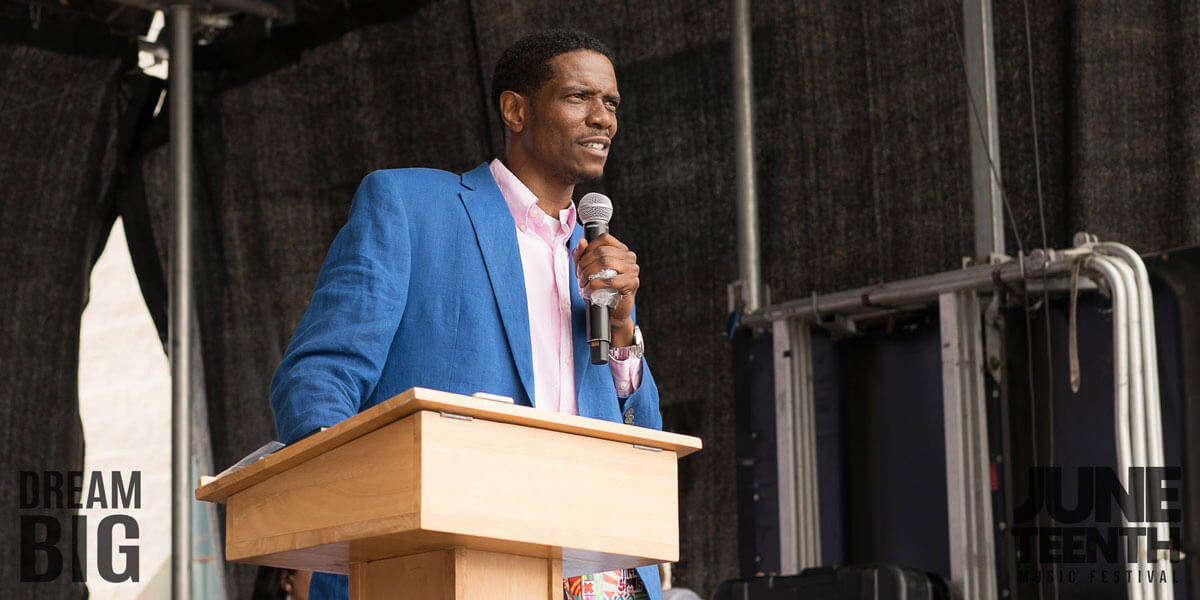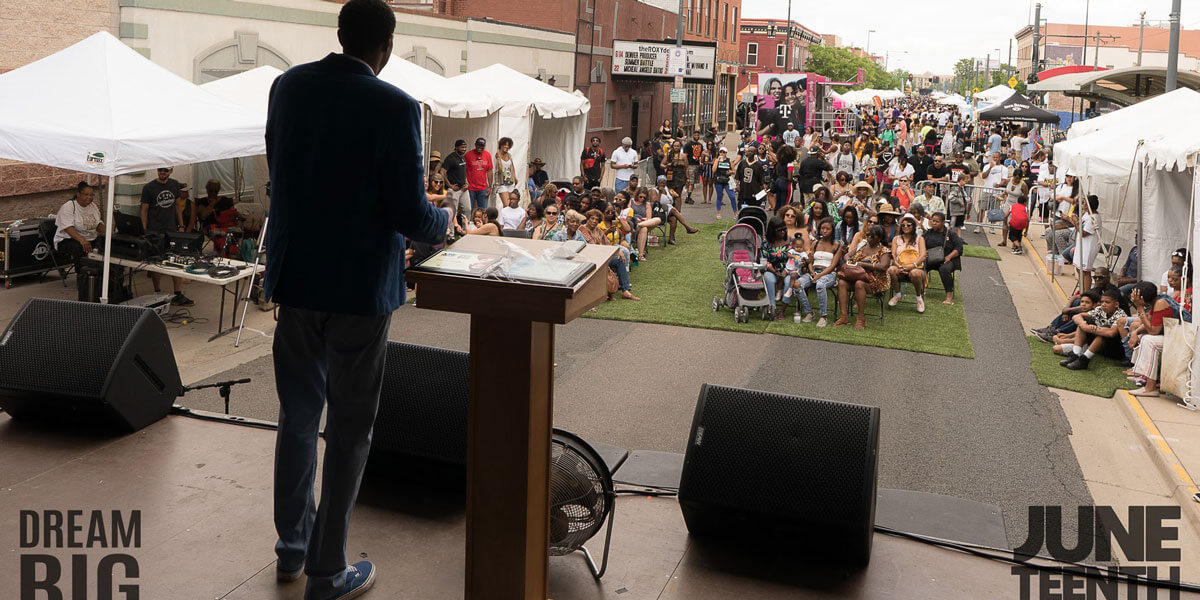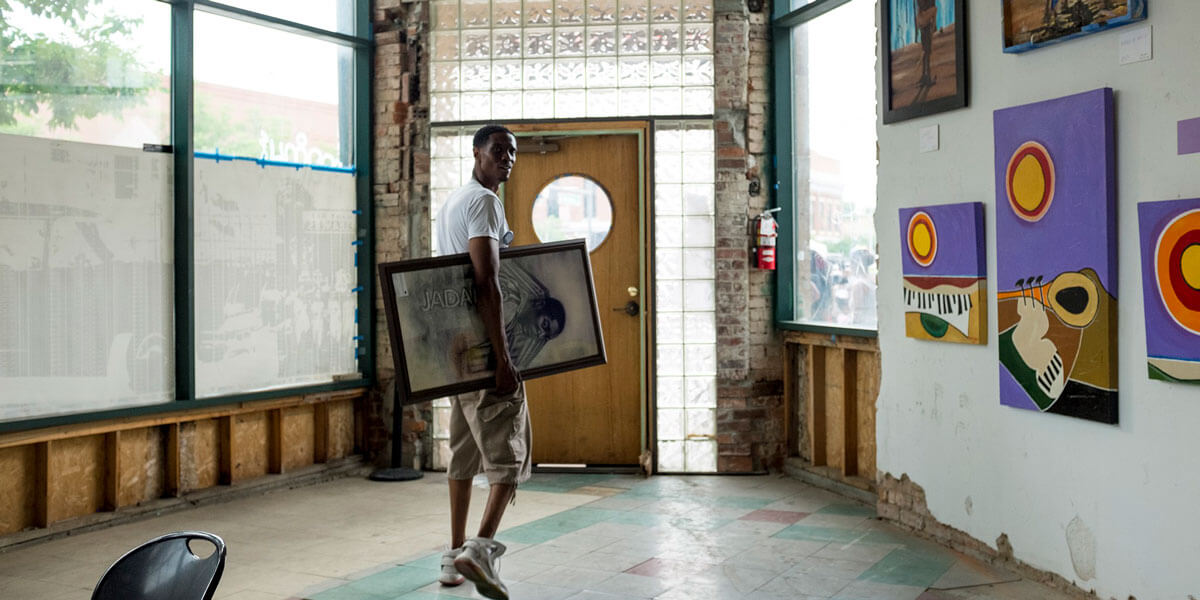When Norman Harris ’94 reflects on his life, he sees the day he was accepted to Colorado Academy as a defining moment, a fork in the road that affected everything that came afterward for the fifth-generation Coloradan who grew up in Denver’s Park Hill neighborhood.
“It was a day that opened up so many possibilities for me, a door that led to a different reality for me,” says Harris, now a community-driven real estate developer and leader for Denver’s Juneteenth Music Festival.
He remembers “like it was yesterday” his interview with then-Middle School Principal Chuck Schroeter. He received a full scholarship to attend CA from Seventh to Twelfth Grade, played on the Boys Varsity Basketball Team, and served on the Alumni Board.
“Going to CA was life-changing,” he says. “I’m forever grateful for the opportunity to go to school there.”

Five Points and jazz
Today, Harris is managing partner for the Holleran Group, an urban land development company with African American leadership and staff. The firm focuses on building cities, towns, and neighborhoods that are economically prosperous, socially equitable, and environmentally sustainable.
“Most people buy property and already have a vision for it,” Harris says. “They show up with their plan and a bullhorn. We’re seeing that that type of model doesn’t work for everyone. We can get better outcomes for communities if we put in the work to understand what they need.”
In this work, Harris spends a lot of time in the historic Black neighborhood of Five Points. Often called the “Harlem of the West,” Five Points is known for its jazz and soul culture. And it’s a place close to Harris’ heart.
“I learned how to count on my grandfather’s cash register in his liquor store [in Five Points],” says Harris, who still owns property there. Harris believes in involving all community entities in the development process and in supporting Black-owned businesses, which have anchored Five Points since its inception.
“We take a community-centered approach that preserves the community identity, puts people over profits, and builds around community strengths instead of just bulldozing them,” he says.
He’s passionate not just about preserving the neighborhood’s past culture but about ensuring that it continues to have space to thrive. At the moment, he’s excited that Jazz Hop is back after time off due to the pandemic. The first-Friday event lets patrons hop from venue to venue to take in multiple jazz performances in a single evening.
“You can’t say Five Points without jazz music,” he says. “It vibrates through the bricks of those buildings more than it does anywhere else in the city.”

A holiday for all Americans
In addition to jazz, Five Points is known for hosting Denver’s annual Juneteenth Music Festival—which Harris calls his “baby.”
“Actually, it’s almost a teenager now,” says Harris, who has led the festival organization, as well as its non-profit foundation, since 2012. “It’s grown up quite a bit. This year we have a super-expansive plan.”
In 2020, the festival reached 250,000 people with a virtual version of the concert. This year’s plan is for an outdoor celebration with expanded space and venues, making it the largest Juneteenth Festival in the nation.
It will span Welton Street from 23rd to 28th Street, with additional venues in Sonny Lawson Park, at Manual High School, and in the neighboring Curtis Park neighborhood. There will be a parade, a pageant, a car show, live performances, art and cultural exhibitions, and food vendors.
And news flash: Denver PrideFest, which has often fallen on the same day as the Juneteenth Festival, has changed its 2021 date to allow people to participate in both events.
Blending the words “June Nineteenth,” Juneteenth commemorates the June 19, 1865 announcement by a Union Army general, proclaiming freedom from slavery in Texas—which marked the end of slavery in the United States. While recognition for Juneteenth has expanded across the nation, Harris notes that Denver residents have been celebrating Juneteenth in Five Points since 1953.
Harris and his team are working with governments at multiple levels to make Juneteenth a city, state, and national holiday. In February, he saw success in Denver when the City Council voted unanimously to make Juneteenth a commemorative holiday in the city, celebrated on the Saturday closest to June 19.
“It’s not just for African Americans to celebrate, it’s the day that all Americans were free, so all Americans should celebrate it,” Harris says. “But probably 85 percent of the country hasn’t heard of Juneteenth, and that is evidence that the U.S. has not truly acknowledged the institution of slavery.”
Harris believes our nation needs an itemization of historical actions and a forum for the oppressed and the oppressor to reconcile differences.
“Until then, we’re never going to have a healing,” he says.

Striving for equity in education
It was Harris’ experience at CA that drove his passion for equity, as he wants everyone to have the opportunity for an outstanding education.
“When I look at the lives of my neighborhood friends who didn’t go to CA, I know it changed the trajectory of my life for the better,” he says. “The education there taught me how to learn, dig for information, and put my best work forward. I now have the ability to create my own legacy, to write my own story, and I wouldn’t have that understanding, had I not gone to CA.”
Harris values his CA education so much that he’s already talking about sending his toddler there.
“I’d like her to be the next Harris who graduates from CA,” he says.
